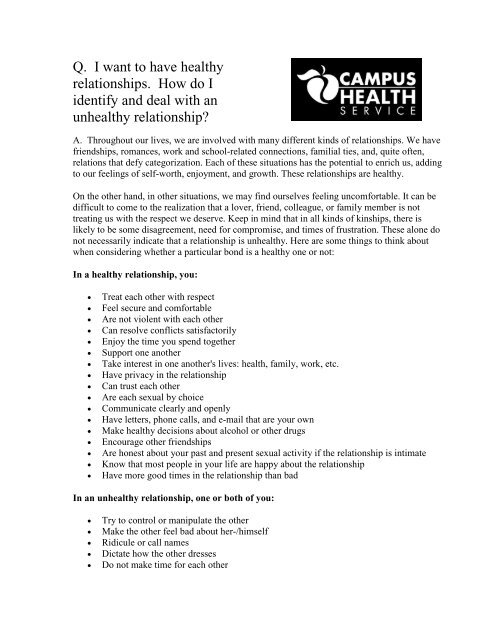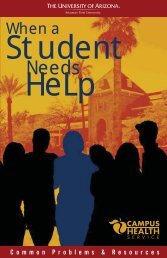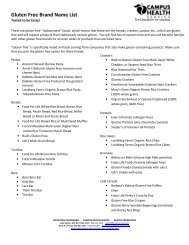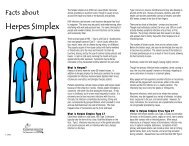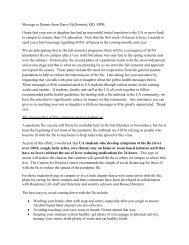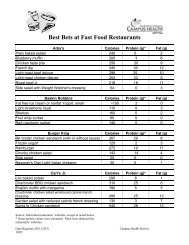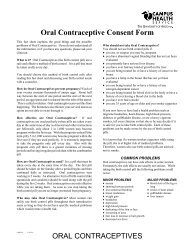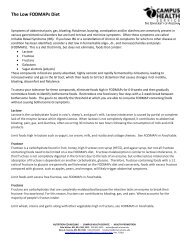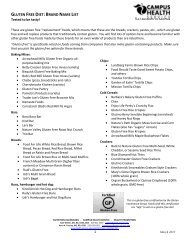Healthy Relationships - Campus Health - University of Arizona
Healthy Relationships - Campus Health - University of Arizona
Healthy Relationships - Campus Health - University of Arizona
You also want an ePaper? Increase the reach of your titles
YUMPU automatically turns print PDFs into web optimized ePapers that Google loves.
Q. I want to have healthy<br />
relationships. How do I<br />
identify and deal with an<br />
unhealthy relationship?<br />
A. Throughout our lives, we are involved with many different kinds <strong>of</strong> relationships. We have<br />
friendships, romances, work and school-related connections, familial ties, and, quite <strong>of</strong>ten,<br />
relations that defy categorization. Each <strong>of</strong> these situations has the potential to enrich us, adding<br />
to our feelings <strong>of</strong> self-worth, enjoyment, and growth. These relationships are healthy.<br />
On the other hand, in other situations, we may find ourselves feeling uncomfortable. It can be<br />
difficult to come to the realization that a lover, friend, colleague, or family member is not<br />
treating us with the respect we deserve. Keep in mind that in all kinds <strong>of</strong> kinships, there is<br />
likely to be some disagreement, need for compromise, and times <strong>of</strong> frustration. These alone do<br />
not necessarily indicate that a relationship is unhealthy. Here are some things to think about<br />
when considering whether a particular bond is a healthy one or not:<br />
In a healthy relationship, you:<br />
<br />
<br />
<br />
<br />
<br />
<br />
<br />
<br />
<br />
<br />
<br />
<br />
<br />
<br />
<br />
<br />
<br />
Treat each other with respect<br />
Feel secure and comfortable<br />
Are not violent with each other<br />
Can resolve conflicts satisfactorily<br />
Enjoy the time you spend together<br />
Support one another<br />
Take interest in one another's lives: health, family, work, etc.<br />
Have privacy in the relationship<br />
Can trust each other<br />
Are each sexual by choice<br />
Communicate clearly and openly<br />
Have letters, phone calls, and e-mail that are your own<br />
Make healthy decisions about alcohol or other drugs<br />
Encourage other friendships<br />
Are honest about your past and present sexual activity if the relationship is intimate<br />
Know that most people in your life are happy about the relationship<br />
Have more good times in the relationship than bad<br />
In an unhealthy relationship, one or both <strong>of</strong> you:<br />
<br />
<br />
<br />
<br />
<br />
Try to control or manipulate the other<br />
Make the other feel bad about her-/himself<br />
Ridicule or call names<br />
Dictate how the other dresses<br />
Do not make time for each other
(continued from page 1)<br />
In an unhealthy relationship, one or both <strong>of</strong> you:<br />
<br />
<br />
<br />
<br />
<br />
<br />
<br />
<br />
<br />
<br />
Criticize the other's friends<br />
Are afraid <strong>of</strong> the other's temper<br />
Discourage the other from being close with anyone else<br />
Ignore each other when one is speaking<br />
Are overly possessive or get jealous about ordinary behavior<br />
Criticize or support others in criticizing people with your gender, race, ethnicity, sexual<br />
orientation, religion, disability, or other personal attribute<br />
Control the other's money or other resources (e.g., car)<br />
Harm or threaten to harm children, family, pets, or objects <strong>of</strong> personal value<br />
Push, grab, hit, punch, or throw objects<br />
Use physical force or threats to prevent the other from leaving<br />
Sometimes it's not so easy to decide if a troublesome tie should be maintained the way it is,<br />
worked on, or ended before it goes any further. One thing to consider is if the relationship was<br />
ever different than it is now. Is there something stressful happening that could be impacting the<br />
way you interact? Maybe money is tight, you've moved, are looking for work, are dealing with<br />
a difficult family circumstance, or are going through some other kind <strong>of</strong> transition. Or maybe<br />
there are problems from a while back that were never resolved, and are now resurfacing. What<br />
in particular is bothering you, and what would you like to see change? Talk over these<br />
questions with each other, or with someone you trust, like a friend, teacher, or counselor. Think<br />
about what, if anything, you can each do to make the other feel more comfortable in the<br />
relationship.<br />
If a partner, friend, or colleague is harming you or your loved ones physically, emotionally, or<br />
sexually, it's time to seek help. If s/he is encouraging other harmful behaviors, like abuse <strong>of</strong><br />
alcohol or other drugs, unsafe sexual activity, or other activities that make you feel<br />
uncomfortable, you have a right to leave. There are a lot <strong>of</strong> resources available to help you.<br />
Perhaps the most important thing to do is to trust your instincts and the people close to you<br />
whose opinions you trust and value. Each and every one <strong>of</strong> us deserves to feel safe, valued, and<br />
cared for. Keep in mind that one <strong>of</strong> the strongest signs <strong>of</strong> a healthy relationship is that both<br />
people involved feel good about themselves. Also, by treating yourself with self-respect and<br />
believing in your right to be treated well, you are taking important steps towards developing<br />
equitable, mutually fulfilling ties in the future.<br />
**** **** **** ******** **** **** ****<br />
If you or someone you know needs help with an unhealthy relationship, the following<br />
organizations can provide information and support. At the <strong>University</strong> <strong>of</strong> <strong>Arizona</strong>, call<br />
Counseling and Psychological Services (CAPS) at 520.621.3334 or the OASIS program for<br />
sexual assault and relationship violence at 520.626.2051. In Tucson, call the 24-hour crisis<br />
line at the Southern <strong>Arizona</strong> Center Against Sexual Assault at 520.327.7273. Another option is<br />
the National Domestic Violence 24-hour hotline at 1.800.799.SAFE (7233).<br />
This information was originally published on the Columbia <strong>University</strong> website “Go Ask Alice”<br />
www.goaskalice.Columbia.edu<br />
July 2006, UA <strong>Campus</strong> <strong>Health</strong> Service


